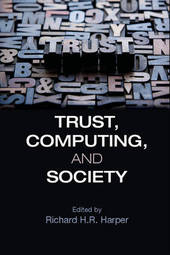
|
Trust, Computing, and Society
Hardback
Main Details
| Title |
Trust, Computing, and Society
|
| Authors and Contributors |
Edited by Richard H. R. Harper
|
| Physical Properties |
| Format:Hardback | | Pages:373 | | Dimensions(mm): Height 234,Width 157 |
|
| Category/Genre | Ethical and social aspects of computing |
|---|
| ISBN/Barcode |
9781107038479
|
| Classifications | Dewey:302.231 |
|---|
| Audience | | Professional & Vocational | |
|---|
| Illustrations |
2 Halftones, unspecified; 6 Line drawings, unspecified
|
|
Publishing Details |
| Publisher |
Cambridge University Press
|
| Imprint |
Cambridge University Press
|
| Publication Date |
28 February 2014 |
| Publication Country |
United Kingdom
|
Description
The internet has altered how people engage with each other in myriad ways, including offering opportunities for people to act distrustfully. This fascinating set of essays explores the question of trust in computing from technical, socio-philosophical, and design perspectives. Why has the identity of the human user been taken for granted in the design of the internet? What difficulties ensue when it is understood that security systems can never be perfect? What role does trust have in society in general? How is trust to be understood when trying to describe activities as part of a user requirement program? What questions of trust arise in a time when data analytics are meant to offer new insights into user behavior and when users are confronted with different sorts of digital entities? These questions and their answers are of paramount interest to computer scientists, sociologists, philosophers and designers confronting the problem of trust.
Author Biography
Richard Harper is Principal Researcher at Microsoft Research in Cambridge and co-manages the Socio-Digital Systems Group. His tenth book, Texture: Human Expression in the Age of Communications Overload, was named Book of the Year (2011) by the Association of Internet Researchers. His prior books include the IEEE award-winning The Myth of the Paperless Office, co-authored with Abi Sellen, and Inside the IMF: An Ethnography of Documents, Technology and Organisational Action.
|